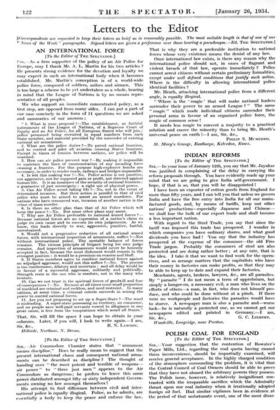[To the Editor of THE SPECTATOR.] SIR,—Air Commodore Chamier states
that " armament means discipline." Does he really mean to suggest that the present international chaos and consequent national arma- ments can be described as discipline ? The thought of handing over " the most potent and terrible of weapons— air power " to " three just men " appears to the Air Commodore as dangerous ; he prefers to leave this same power distributed amongst fifty or sixty independent Govern- ments owning no law amongst themielves I
His attempt: to find difference between civil and inter- national police is equally illogical. Police, as he admits, are essentially a body to keep the peace and enforce the law. That' is why they are a preferable institution to national forces whose very existence means the denial of any law.
Once international law exists, is there any reason why the international police should not, in cases of flagrant and violent breach of that law, operate immediately ? Police cannot arrest citizens without certain preliminary formalities, except under well defined conditions that justify such action. Where is the difficulty in allowing international police identical facilities ?
Mr. Heath, attacking international police from a different angle, is equally illogical.
" Where is the ' magic' that will make national leaders surrender their power to an armed League ? " The same " magic " which made individual citizens surrender their personal arms in favour of an organized police force, the magic of common sense !
It needs less magic to convert a majority to a practical solution and coerce the minority than to bring Mr. Heath's universal peace on earth !—I am, Sir, &c.,
PHILIP S. MUMFORD.
St. Mary's Grange, Easthorpe, Kelvedon, Essex.










































 Previous page
Previous page